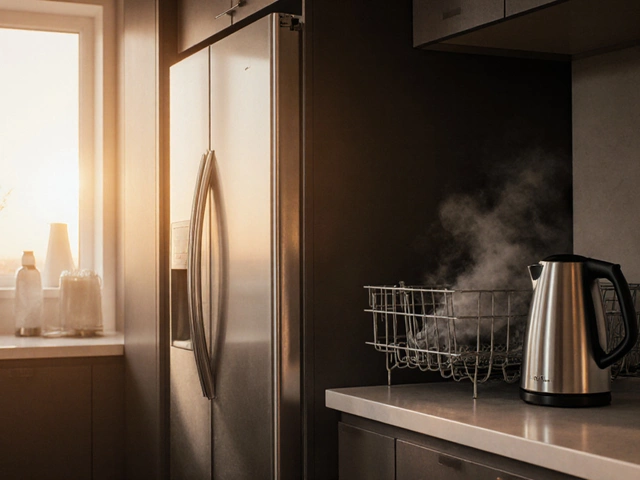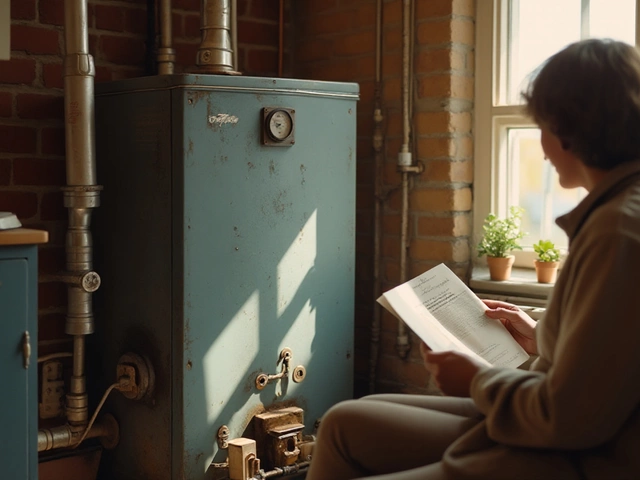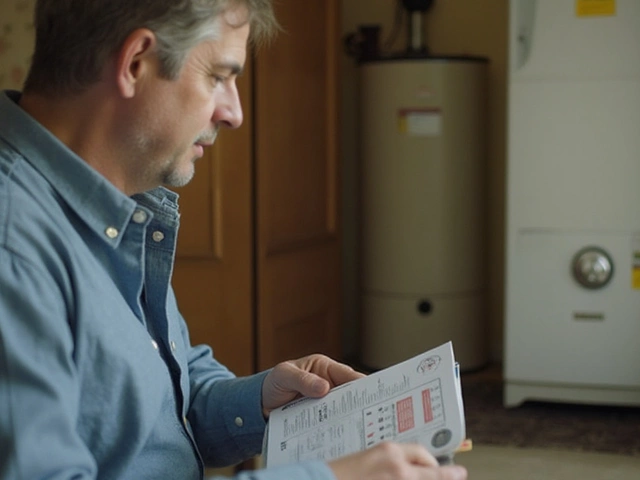Boilers are the unsung heroes of comfort in our homes, keeping us warm through chilly days and ensuring we have hot water when needed. But a debate waiting to be settled is whether frequently switching your boiler on and off could be harmful. It's a topic that leaves many scratching their heads, questioning their daily routines. After all, nobody wants to face an unexpected boiler breakdown, especially during the colder months.
This article will shed light on what really happens inside your boiler when you flick that switch, and whether your actions are contributing to potential wear and tear. Understanding the mechanics and behavior of your boiler can lead to optimal use and possibly save you from costly repairs down the line. We'll also share tips and signs to watch for so you know when to call in the experts.
- Understanding How Boilers Function
- Common Myths About Boiler Usage
- The Impact of Frequent Switching
- Tips for Efficient Boiler Use
- When to Seek Professional Help
Understanding How Boilers Function
The humble boiler ironically forms the backbone of a household's warmth and comfort, yet many of us take it for granted. Understanding how boilers work is the first step in preventing issues and getting the most out of them. At its core, a boiler heats water using fuel or electricity, turning it into steam or hot water that travels through a network of pipes and radiators over your home. This central system not only keeps you warm but also provides hot water whenever you need it, doing all this while largely going unnoticed in a cupboard or basement corner.
Modern boilers come in various types, including combi, system, and conventional. Each type has its unique method of storing and distributing hot water. Combi boilers, for instance, are popular in small homes since they heat water directly from the main supply, eliminating the need for bulky storage tanks. System boilers, on the other hand, store hot water in a cylinder, making them ideal for homes with multiple bathrooms. Knowing what kind you have isn't just trivia; it directly affects your boiler's behavior and potential issues. The choice you made (or inherited) regarding boiler type could dictate how often you should turn it on and off.
Interestingly, the mechanism within most boilers is not unlike that of a car engine. When you switch your boiler on, a gas valve opens and electricity powers an igniter to light a pilot light or an electric ignition. This ignition sets in motion a chain reaction with the main burner, heating up the water. Some boilers use an oil-fired burner instead. Once heated, this water is sent through your home's circuits by a circulating pump. It's crucial to understand that each ignition causes wear, much like starting a car can wear on the starter motor. Many people are surprised to learn that almost 60% of household energy bills come from heating homes and water, highlighting the significant role a boiler plays in energy consumption.
But what happens when you cycle your boiler on and off? A lot of people don't realize every time this happens, the burner experiences thermal expansion and contraction, which can potentially lead to parts wearing out prematurely. Moreover, turning a boiler on forces it to work from a cold start, consuming more energy to compensate for the initial warm-up—this can affect energy efficiency. This heat exchange process that's fundamental to boiler function is exceptionally efficient when uninterrupted, but disruption not only wears on mechanics but also hikes your energy bills.
As an expert from the Energy Saving Trust said, "Regular maintenance and understanding your heating system can save money in repairs and energy bills." Truly understanding how your boiler functions not only helps in diagnosing potential issues but empowers you to operate it in an energy-efficient manner. So while the temptation to flick the switch off when it's unneeded may persist, know that there's a balance to be struck for longevity and efficiency.
It's essential to note that each home and its boiler setup are unique, and learning how components like thermostats, timers, and controls operate can be incredibly beneficial. Keeping an eye on things like water pressure and being able to identify strange noises can make all the difference in either catching a minor issue early or dealing with a blistering headache later. Frequent checking typically leads to a better understanding of your boiler, giving you peace of mind and hopefully avoiding the surprise of a cold shower or worse yet, pipes bursting.
Perhaps you're already using smart thermostats or newer models that allow for precise control over activities. These innovations can take a lot of the guesswork out, automating power cycles based on learned routines, and essentially offering a more energy-efficient solution. But no matter how advanced your system is, knowledge remains key. Don't shy away from diving into the details – knowledge of your boiler's specifics will be your best line of defense and offense.
Common Myths About Boiler Usage
There seems to be a myriad of misconceptions surrounding the proper use and maintenance of boilers. These myths can lead to unnecessary anxiety or, worse, improper handling that might harm your system. One common belief is that constantly turning a boiler on and off will lead to significant damage or even cause it to break down. This idea likely stems from the misunderstanding of how boiler systems operate and their resilience. While it's true that excessive strain isn't ideal for any mechanical system, modern boilers are generally designed to handle on and off cycles without immediate harm.
Another myth stems from the idea that leaving a boiler running continuously is more energy-efficient than allowing it to cycle. This might have been true in the early days when boilers were less efficient, but technological advances have made newer models much more adaptable. In fact, high-efficiency boilers are designed to reach optimal operating temperatures quickly, making frequent cycling far less burdensome than in the past. Still, some users cling to the belief that it’s better for the boiler’s longevity to be left running, which leads to higher energy bills and no real added benefit to appliance health.
Some people also believe that a boiler needs to be serviced only when a problem arises. This myth can lead to catastrophic failures if ignored. Regular maintenance is vital for a boiler's reliability and efficiency. Just like how regular dental check-ups can help prevent cavities, boiler maintenance can identify potential issues before they escalate. Skipping these checks can prove to be an expensive mistake, both in repairs and possibly in replacing the entire unit. Manufacturers usually recommend yearly servicing to ensure everything runs smoothly. An ignored but simple annual service could make a world of difference in the health of your boiler.
Sometimes, myths seep in from recommendations that may have been accurate some time ago but have since been supplanted by better knowledge and technology changes. For instance, older recommendations about shutting down boilers in milder months no longer hold true for some climates and units, as they can actually lead to system issues if restarted in colder months under less-than-ideal conditions. Therefore, it's crucial for anyone using a boiler to continuously update themselves on their specific boiler model by closely reading the user guide and, if needed, consulting heating professionals.
Caryn Levine, an expert in boiler engineering, stated in an industry publication, "Boilers, just like any household appliance, require user awareness and care. Keeping abreast of modern features and capabilities can not only save users money but extend the function of their heating systems for years."
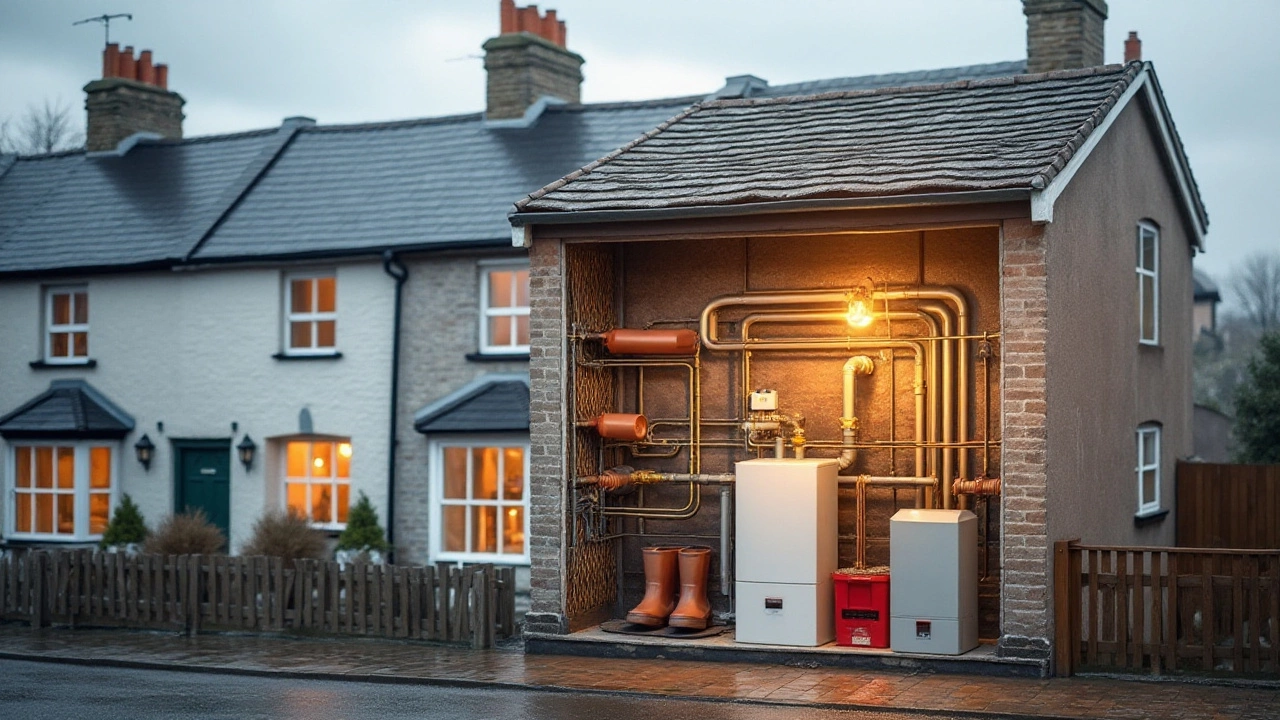
The Impact of Frequent Switching
When it comes to handling your boiler, it's not just about turning it on and off; it's about understanding the underlying mechanisms at work. Each time you power up your boiler, a series of complex processes sparks into action. The burner ignites, and as the water heats up, pressure builds. Frequently interrupting this cycle, by switching the boiler off and then on again, can lead to unwanted stress on components such as the heat exchanger. It's like starting a car multiple times a day; there's wear and tear involved, and your boiler is no different.
One of the lesser-discussed aspects of this practice is its effect on the boiler's efficiency. Boilers are at their best when they operate for extended periods at a steady rate. A **boiler** that is constantly cycling has to go through its warm-up phase repeatedly, which not only wastes energy but also leads to inefficient burning of fuel. The initial warm-up uses the most fuel compared to the boiler running at a constant temperature. So, constantly turning the boiler off and on could inadvertently be driving up your energy bills without offering the warmth you desire.
Interestingly, modern boilers are equipped with mechanisms to mitigate damage from frequent cycling, yet these features have their limits. These systems can handle regular home heating needs but weren't designed to withstand incessant on-off cycles as routine. Extended exposure can fatigue the components, just like a rubber band losing elasticity after being stretched repeatedly. Moreover, boiler parts like the ignition system or electrical circuits could fall victim to early wear, resulting in repair or replacement much sooner than anticipated.
Boiler repair experts often note that the sound of frequent clicking from the boiler is a symptom of 'short cycling,' a condition that can lead to premature boiler failure if not addressed. You might hear the boiler fire up only to shut down shortly after, which is the equipment's way of performing numerous mini-cycles. This issue is frequently exacerbated by improperly sized boilers, as a larger unit may not run long enough to reach its peak efficiency and can cycle off before it truly starts to operate efficiently.
"Consistent on-off cycling can lead to what's known as short cycling," explains James Waddington, a renowned heating engineer. "Short cycling increases fuel consumption and can significantly increase maintenance needs over time."
To understand the broader implications, consider that tolerating the frequent brief cycles could halt your comfort and convenience sooner than expected. A table might be helpful to bring this point home:
| Consequences of Frequent Boiler Switching | |
|---|---|
| Component Wear | Accelerates wear on critical parts like the oil pump, heat exchanger, and electrical circuits. |
| Efficiency Loss | Increases energy consumption due to constant warm-up phases. |
| Repair Frequency | Heightened chances of components needing repair or replacement frequently. |
Thus, while the temptation to frequently manage your boiler is understandable, doing so without considering the broader impacts can create a cycle where you potentially harm your boiler in an attempt to save a bit on energy, when in fact you might be doing the complete opposite.
Tips for Efficient Boiler Use
Many homeowners don't realize that their everyday habits can significantly affect their boiler’s lifespan. It isn't just about the initial installation and annual service, but how you interact with your heating system day-to-day. To start, proper timing is crucial. While it might seem convenient to leave it running all day, setting a timer for your boiler can greatly increase its efficiency. Programming it to turn on just before you wake or return from work allows your home to be warm when needed, conserving energy in the process.
Another critical factor is the thermostat setting. It’s tempting to ramp up the heat during winter's chill, but maintaining a moderate and consistent temperature is healthier for your boiler. Rapid heating can cause wear; therefore, slowly increasing the temperature can preserve the machine's internal components. Additionally, consider installing a smart thermostat, allowing you to monitor and adjust settings remotely. This innovation isn’t a gimmick; it saves significant energy when employed correctly.
Regular inspection and bleeding of radiators is another often overlooked but essential task. Air pockets can form, causing your system to work harder and less efficiently. To avoid this, make sure you check each radiator periodically and bleed them if necessary. This simple process ensures that your boiler is operating at its peak capacity, delivering consistent warmth throughout your home.
Watch for Warning Signs
Staying alert to the sounds your boiler makes is just as critical. Whistling, clanking, or any unusual noises could indicate a problem. Ignoring these early signs can lead to more significant issues, so it's essential to address them promptly. Checking the pressure gauge is another vital aspect since low pressure can signify a leak, whereas high pressure might strain the system. Keeping an eye on these metrics helps you catch problems before they escalate."Maintenance doesn't just save you money, it makes your home safer. It’s far better to address a small service now than to be caught in a breakdown in the dead of winter," says Emily Johnson, a respected energy expert.Following her advice, an annual maintenance check by a professional is recommended even if your system seems to be running smoothly. Such checkups can reveal hidden issues and ensure your boiler is prepared for another year's use.
In a world where sustainability is becoming more crucial, considering your boiler's impact on the environment is wise. An energy-efficient model can greatly reduce your carbon footprint. If your boiler is over a decade old, it might be time for an upgrade to a newer, more efficient model. This initial investment can save you money on your energy bills over time.
| Boiler Model | Efficiency Rating | Potential Savings |
|---|---|---|
| Model A | 90% | $450/year |
| Model B | 85% | $400/year |
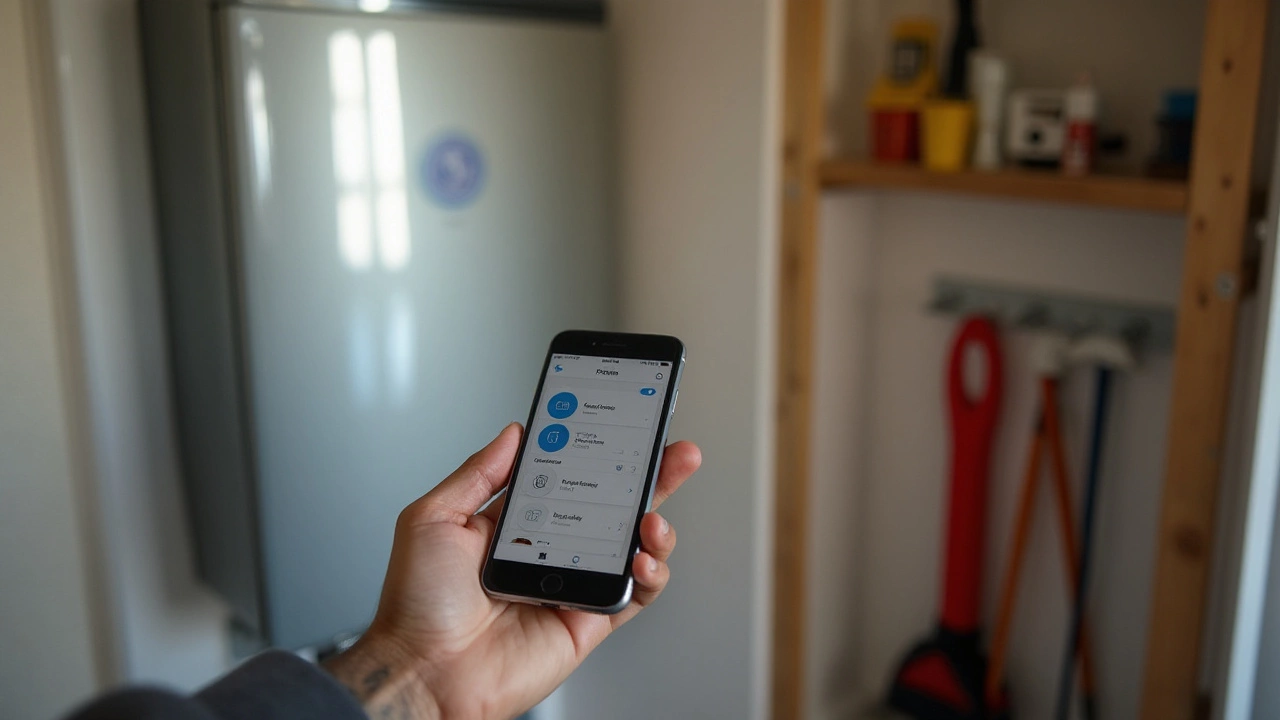
When to Seek Professional Help
Even the most diligent of homeowners can find themselves facing boiler trouble from time to time. That’s why knowing when to call in a professional is crucial. Boilers are complex systems—they are more than just a tank of hot water, housing an intricate network of pipes, heat exchangers, and electrical elements. A savvy individual might feel tempted to tinker around, but caution should prevail. Many modern boiler systems have integrated technology and safety features that can be compromised by novice tinkering. The need for professional intervention is not just a matter of caution; it’s about ensuring safety and preserving the efficiency of your home’s heating system.
Your first port of call should always be comprehensive observation. Listen for strange noises like banging or whistling—these auditory cues often suggest internal issues such as trapped air or limescale buildup, which can stress the system and lead to broader problems. Check for visual cues as well; if you ever spot water pooling around your boiler, it’s time to make a call. Leaks could indicate corroded pipes or a faulty pressure relief valve, both needing professional expertise for safe and effective repairs.
Changes in energy efficiency are another key indicator. If your heating bills are creeping up without explanation, this could be symptomatic of a boiler working overtime due to internal issues. Energy wastage isn't just about cost; it suggests the system isn’t operating optimally, potentially shortening its lifespan. An engineer can assess these changes, recalibrate or replace faulty components, and save your budget in the long run.
Additionally, don’t overlook regular safety checks by professionals, which are a proactive measure rather than reactive. An annual boiler service is recommended by manufacturers to extend lifespan and maintain warranty conditions. If you notice persistent pilot light issues, erratic temperature changes, or the smell of gas, these aren't items to delay on. Immediate professional inspection is warranted to ensure there are no safety hazards.
Martha Wells, a renowned home energy expert, advises, "Even if the boiler seems to be working fine, a healthy respect for routine professional maintenance can save significant costs in emergency repairs or replacements over time." Her insights underscore the balance between DIY enthusiasm and respectful deference to professional skills.
Lastly, the complexity of modern boilers demands technical expertise, especially with newer models featuring digital controls and complex energy-efficient technologies. These are not areas where a DIY mindset typically flourishes. If you find your digital controls are unresponsive or displaying error codes you don’t understand, reach out to a heating engineer who’s familiar with the latest technologies.
In summary, knowing when to turn to professionals is a vital part of boiler maintenance strategy. Be observant, proactive, and safety-conscious, ensuring your boiler system remains a reliable fixture in your home throughout its lifetime.



